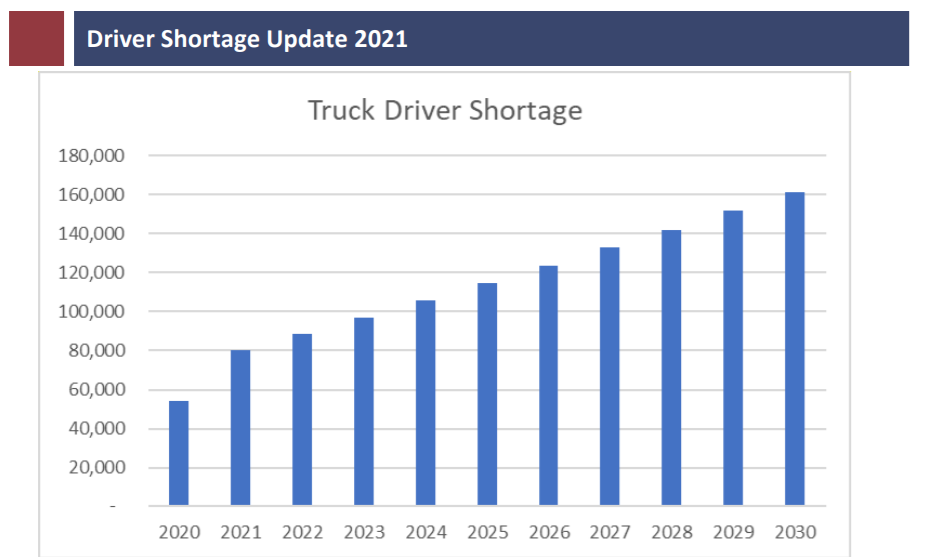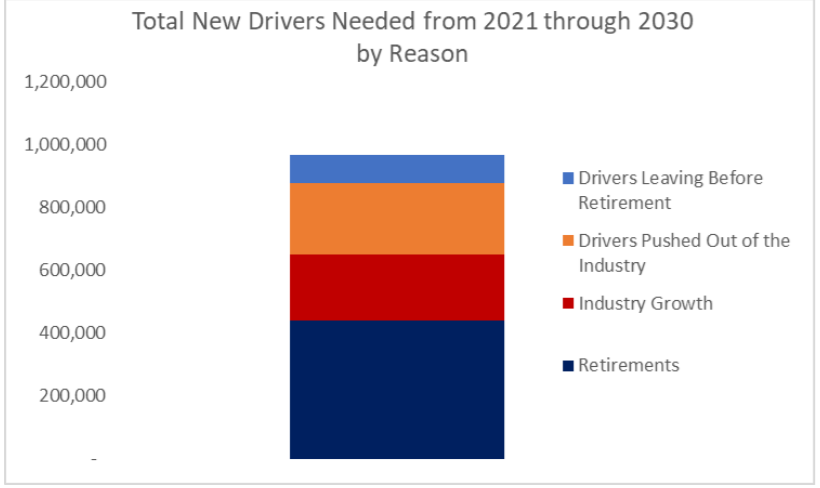U.S. driver shortage worse than ever: ATA
The U.S. trucking industry is short about 80,000 drivers today – an all-time high – and if current trends continue, will be short 160,000 drivers by 2030.
The figures come from the latest analysis by the American Trucking Associations (ATA). ATA chief economist Bob Costello discussed the report with media, saying the numbers should come as a warning that the supply chain issues seen today could be permanent in the future due solely to a lack of drivers.
The driver shortage was first documented by ATA in 2005.
“Those items that were true in 2005 are still true today,” Costello said, citing factors like an aging demographic, an inability to attract women, and lifestyle challenges. “We have some new things that have exacerbated the shortage.”
Among those, he listed the pandemic, which curtailed the flow of new entrants, and a surge in e-commerce. Costello said van delivery drivers may make less money than over-the-road truckers, however they are home every night and can supplement their income as rideshare drivers.

There’s also the drug and alcohol clearinghouse, which came into effect in January and has sidelined about 70,000 drivers.
“The vast majority aren’t even attempting the return-to-duty process,” he said, noting while ATA supports the clearinghouse, it has contributed to tightening driver supply.
Costello noted the driver shortage actually improved just prior to the pandemic, due to softening freight demand.
“We made up a little bit of the gap, then this pandemic hits,” said Costello.
He said shippers have a role to play in solving the problem, by reducing wait times for drivers at their facilities.
“This is a warning to the entire supply chain,” Costello said. “I really do think the supply chain problems of today are a glimpse into our future if we do not fix this.”
As an example, he said consumers may find only three varieties of apples at their local supermarket instead of seven, as some shipments aren’t able to be delivered.
While truck driver wages are on the rise (Costello said average weekly earnings in the industry are increasing at five times the historical average), he said lifestyle issues are a bigger concern. As trucker wages increase, he said many drivers would prefer to drive less and enjoy more home time.
The shortage is most pronounced in the over-the-road truckload segment. But even LTL and private fleets are struggling, Costello said, noting private fleets that historically never had to offer signing bonuses are now doing so.
Over the next decade, ATA projects the U.S. industry will need to attract nearly a million drivers, primarily due to driver retirements. “We need to figure out how to get a lot of people into this occupation over the next 10 years,” Costello said.

Getting young drivers approved to run across state lines is another partial solution, Costello said. While fleets have plenty of intrastate freight, it tends to be inner-city and more challenging for newly licensed drivers.
“It’s better for those folks as they’re learning to be out on the open road,” he said. The average newly trained entrant to the profession is 35 years old. Costello said that’s when they typically want to be home with their families.
Costello also noted fleets do receive lots of applicants, but “there’s a quality issue here. They cannot hire the vast majority of them.”
Driver turnover also remains a challenge, at about 90% today, but well off the record 136% in 2005.
“A thing to note about the shortage is that before the pandemic, we were adding drivers to the industry – even though we had a shortage, more people were entering the industry,” Costello said. “The issue is that new entrants into the industry didn’t keep up with demand for goods.”
An executive summary on the report can be found here.
Have your say
This is a moderated forum. Comments will no longer be published unless they are accompanied by a first and last name and a verifiable email address. (Today's Trucking will not publish or share the email address.) Profane language and content deemed to be libelous, racist, or threatening in nature will not be published under any circumstances.
There is not a shortage of drivers. What there is is a shortage of drivers willing to work for slave wages. Many people have cdls. Do the math for what an average driver makes. Then subtract expenses to get the net. It is chicken feed.
-
You are so right. Run our butts off for little pay. I was only home for 40 days last year. I’m thinking construction would be better.
“…can supplement their income as rideshare drivers”…? Really? that’s Costello’s answer to low short haul wages? I assume he’s home every night… does he have to ride share? I think all drivers wages will have to go up… significantly in some situations.
Nice Piece James… I assume discussions of vax requirements will be coming shortly? This is like watching a slow motion car wreck…
Cheap rates are similar to drugs.
JUST SAY NO !!!!
Hi James-Regarding driver shortage-The day Line-Drivers are paid equal to other Trades the shortage will subside. During my 50 years in the industry driver complaints have not changed-low wage scale-being treated like second class citizens by shippers – brokers-waiting time unpaid etc. Commercial accidents at an all time high due to “unskilled drivers”. I was a fleet manager-Commercial accident investigator and Driver trainer for companies etc. Nothing will change until these challenges I have stated are seriously implemented. – Thanks – John Wihksen, Vancouver.
The problem not enough time and money is spent on new drivers. In ontario new drivers are too expensive to insure for small fleets. We need to look at how elogs help to push truck driver to do other things. Also overtime pay is required to compete with other jobs. Also better medical care and a card that provides medical care anywhere in Canada,U S and Mexico. Many truck driver left last year for construction and other jobs.